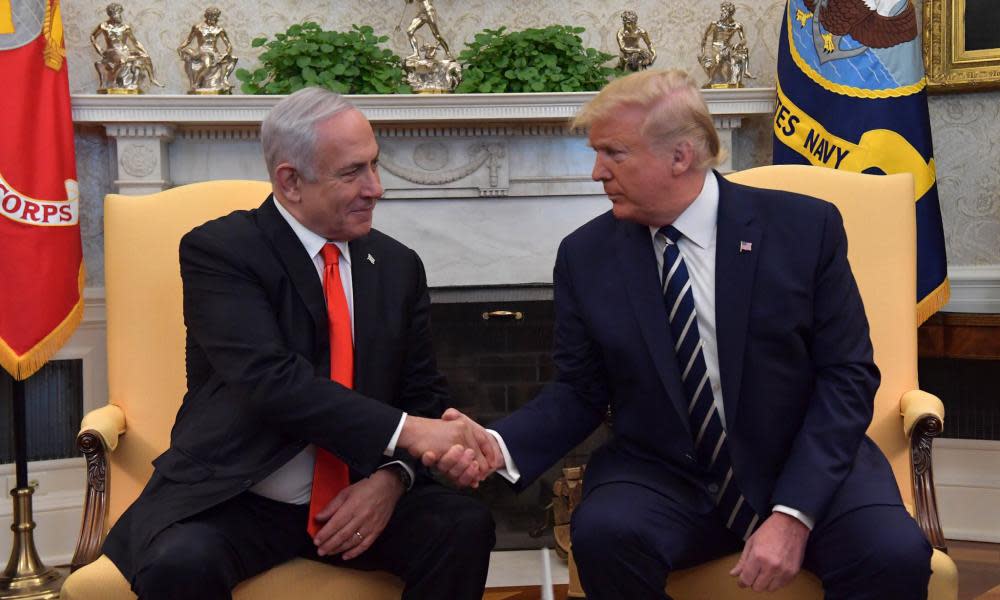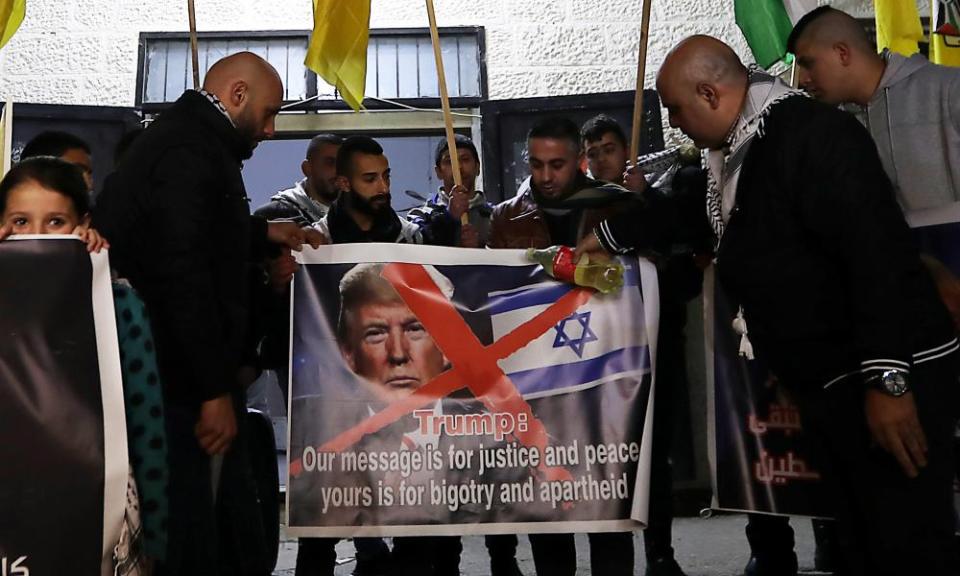Donald Trump to publish delayed Middle East ‘peace plan’

Donald Trump will unveil his much-delayed Middle East “peace plan” alongside the Israeli prime minister, Benjamin Netanyahu, on Tuesday amid Palestinian protest and a rising global chorus of doubt about its timing and substance.
The US president said on Monday that he would announce the plan at noon Washington time (1700 GMT). “And it’s a very big plan,” Trump said after private meetings with Netanyahu and his election opponent, Benny Gantz, in the White House.
The choreography between the US and Israel has been interpreted as a convenient distraction for both Trump, who faces an impeachment trial, and Netanyahu, who faces three criminal corruption indictments and an uncertain election campaign.
Unconfirmed leaks have reported that the measures would be extremely favourable to the country, allowing it to annex much of the Palestinian territories, including Jewish settlements, and all of contested Jerusalem. The Palestinians may be granted some form of self-rule, but under tight restrictions.
Israeli settler leaders who accompanied Netanyahu on his trip appeared to confirm some of those details, complaining that Palestinians should not be allowed any type country, even if it was territorially broken up and without an army or an airport.
“[Netanyahu] tried to sell us on the idea that it wouldn’t really be a Palestinian state,” said David Elhayani, a prominent settler figurehead, according the the Times of Israel newspaper. He added the plan include large economic incentives to the Palestinians.
The Palestinian prime minister called on Monday for world powers to boycott the initiative. “This is a plan to protect Trump from impeachment and protect Netanyahu from prison. It is not a Middle East peace plan,” Mohammad Shtayyeh told a cabinet meeting.
The crisis appeared to bring a rare display of unity from rival Palestinian factions, Hamas in Gaza and Fatah in the occupied West Bank. The two parties, long-time enemies who fought a short civil war in 2007 for control of Gaza, agreed to hold an emergency meeting in Ramallah to discuss a joint response.
Protests were planned in the Palestinian territories for Tuesday and Wednesday, raising the chance of clashes with Israeli troops. The Israeli military said it had reinforced security in Jordan Valley, a large section of the West Bank that the Israel government intends to annex.
Details of the proposal have not been disclosed. However, Hebrew-language media citing Israeli officials have reported what they say are leaks of the main parts. The Guardian has not confirmed the below and different reports have been contradictory, although the points are broadly in line with the direction the Trump administration has taken on Israel and Palestine.
Most or all of Jerusalem will be handed to Israel.
Israel will formally declare most or all Jewish settlements in the occupied West Bank as part of its country.
Israel will retain control of the Jordan Valley, a large section of the West Bank that borders Jordan.
Millions of Palestinian refugees and their descendants will not be allowed to return to their homes in Israel, or at least not in large numbers.
A Palestinian state of some sort will be established in the remaining broken-up territory.
Palestinian statehood will be limited – possibly demilitarised with no control of its skies or borders – and dependent on Hamas relinquishing its weapons in the Gaza Strip.
Near an Israeli army checkpoint at the northern edge of Ramallah, dozens of teenage boys with scarves wrapped around their faces pulled tyres covered in petrol into the road. “Do you have a lighter?” one asked. “We’re doing this because they are going to steal our land,” said another.
Two ambulances were parked by the side of the road. Hundreds of Palestinians waited in their cars behind the small protest to get through the checkpoint to their homes in other parts of the West Bank during the school rush.
Ihab Marwan, a 35-year-old teacher who was passing by on his bike, said the demonstration would have no effect. “This will last two or three days. After that, they will be gone,” he said. “It breaks my heart.”
During a tour of the valley on Monday, Israel’s interior minister, Aryeh Deri, said he was gearing up for the move, which Netanyahu already promised in an election pledge in September. “We’ve started to prepare for an annexation – we are getting the paperwork ready,” Deri said.
Tuesday’s attention-grabbing announcement is sure to overshadow Netanyahu’s indictment woes back home.
Earlier in the day, Netanyahu withdrew a request for parliamentary immunity from the charges. He made the move just hours before Israel’s parliament, the Knesset, looked likely to form a committee that was expected to rule against it.
Washington also invited Gantz to make sure whoever becomes Israel’s next leader after the 2 March election will be on board in advance. Gantz later said he would work to implement the plan.

Few political aspects of the proposal have been disclosed, apart from an economic conference last summer that sought to raise money from Gulf countries to fund it. The plan was drafted by Trump’s son-in-law, Jared Kushner, with input from the US ambassador to Israel, David Friedman, a vocal supporter of Israeli settlements in the occupied Palestinian territories.
The Guardian understands that, unlike previous attempts that have focused on getting Israeli and Palestinians leaders to find common ground, Washington’s new plan is dozens of pages long and has been drafted as a set of detailed suggestions.
Sensitive issues that have tripped up past efforts, such as the rights of millions of Palestinian refugees and their descendants, will be addressed.
Trump’s administration has promoted itself – especially to a large section of US evangelical voters who ardently back the Jewish state – as the most pro-Israel in the country’s history. Washington has already implemented a number of historic changes in the region.
It reversed decades of its policy by refraining from endorsing the internationally backed two-state solution. It has also recognised Jerusalem as Israel’s capital, cut millions of dollars in aid to Palestinians, and announced that it no longer views Israeli settlements in occupied territory as “inconsistent with international law”.


